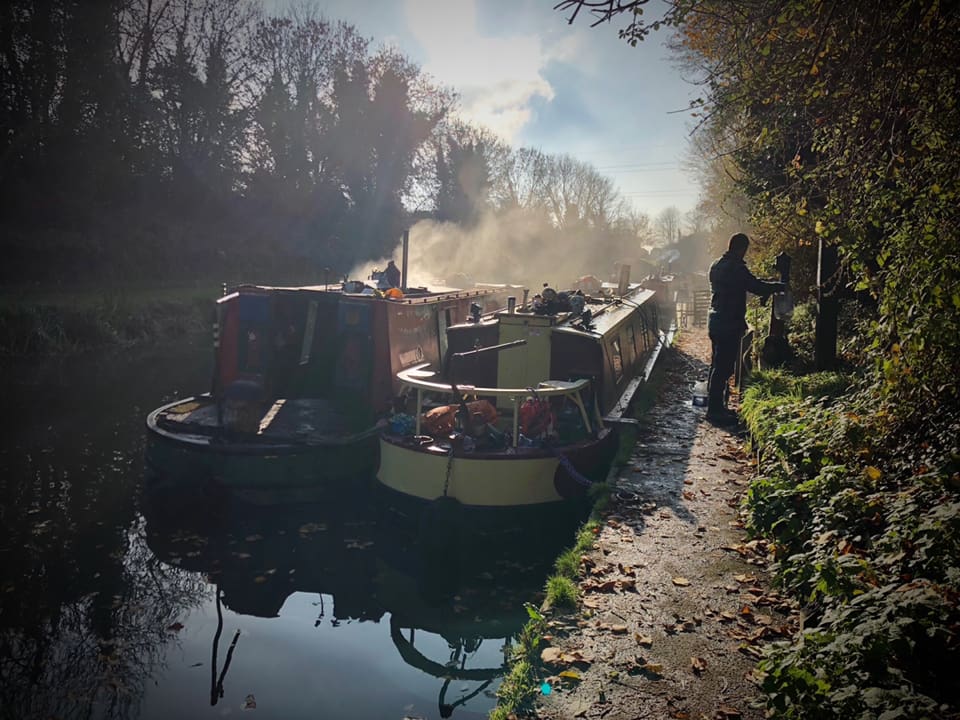Sam Worrall, Health Policy Officer at Friends, Families and Travellers, authors this blog about life as a liveaboard boater.
12 minute read.
Having already spent 10 years living as a New Traveller, off grid in various places around the UK and Europe in my converted bus, I found myself naturally drawn to life on the canal. After staying on a friend’s boat for 6 months whilst working in Bath, in North East Somerset, I decided to swap land for water and bought my own narrow boat. Over the next 4 years or so I was lucky enough to find myself living within one of the most embracing and vibrant alternative communities in the country. Not only that but a change of career path shortly after moving onto my boat found me a new job; setting up a pilot project for a Gypsy, Traveller & Boater support service at a local charity, with funding from the NHS Clinical Commissioning Group. With other boater friends, I also helped to revive floating markets along the Kennet & Avon canal, to help support boaters trying to make a living and show the general public the positive arts and cultural attributes the liveaboard community brings to the canal.
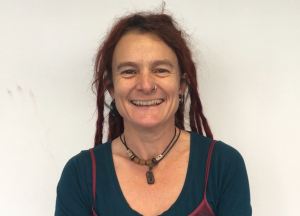
Living the dream
There is no doubt that the canals of this country offer a different pace of life amongst often stunning rural surroundings. Even within city boundaries, the water roads weave hidden and secret ways behind and beneath familiar landmarks, offering old routes through modern urban sprawls.
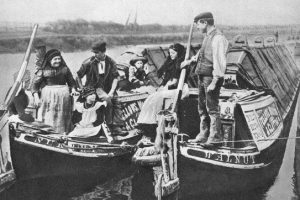
People have been living on barges and narrowboats since the canals (or ‘the cut’, as it’s called) were built in the 1700’s. Originally this was for work, transporting raw materials and goods across Britain. Nowadays, the majority of liveaboard boaters have jobs off the canal, but choose to live a more sedate and off grid lifestyle. Liveaboards are a diverse group of people. They may have chosen to move onto a boat for any number of reasons. Most commonly, these are;
- Being priced out of local housing
- Being attracted to boat life and the community
- Retired people wishing to downsize and live more simply
- New Travellers forced away from land-based travelling
- Following a separation or divorce and using the settlement to buy a boat
Some liveaboards can afford to live in marinas along the canal but often these places are few and far between, with limited spaces. Many marinas stipulate that people cannot live aboard their boats full time. For those who cannot find residential marinas, or canal bankside (online) moorings, or who choose to live more freely, living and cruising on the canal, becoming a “boater without a home mooring” is the other option. It is this group of boaters (very much like the original Bargee Traveller families) who maybe more likely to suffer health inequalities.
Living and travelling along the canals is not as easy as it may sound for many liveaboards. There are strict guidelines laid down by the Canal and River Trust, who own and manage the 2,200 miles of inland waterways across the UK. These guidelines for ‘continuous cruising’ were brought in during 2015. Previous to this, boat life was more laid back and there was no legislation regarding movement of boats, beyond the 1995 Waterways Act, which required boaters to move from place to place every 14 days.
The current guidelines stipulate that you must move your boat at least one kilometre every 14 days and move in a continuous direction along the canal (e.g. not turning around and staying in one small area). You are required to cruise at least 20 miles in one direction within a 12 month licence period. Whilst not enforceable by law, if boaters fail to meet the requirements, they can have their boat licence removed, which ultimately means their vessel is on the water unlawfully and can then be seized and removed by the Canal and River Trust.
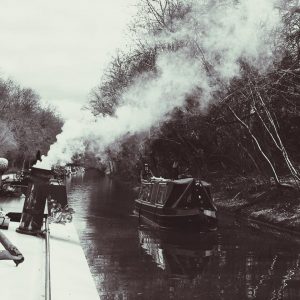
Since these guidelines were brought in, the people who have failed to comply and face the stress of enforcement procedures, have usually been the most vulnerable of boaters, and most commonly includes those with poor physical and mental health, those on low incomes, or those having to stay in one place to access support services. Also affected are families with children in schools. Similar to the issues around forced eviction and being moved on as Gypsy and Traveller communities face, the impact upon boaters with regard to compliance with the guidelines for cruising often creates additional stress and increased levels of anxiety, depression, as well as having a negative impact upon children’s school attendance and strain on family relationships.
It is boaters without home moorings who often fall under the radar of health and welfare services, and who suffer similar inequalities in accessing services that ethnic Gypsies and Travellers do. The issues that water based travelling communities face may include;
- No permanent local address
- Barriers to accessing healthcare and awareness of services available
- Not being in receipt of benefits; living in poverty
- Unhealthy and unsafe living conditions
- Discrimination from the wider community
No Fixed Abode
Not having a permanent address, or using a care of address further afield, is an issue many boaters without home moorings face. In practical terms this impacts upon the ability to get things such as vehicle insurance and bank accounts etc. It also affects access to healthcare. People are routinely turned away from GP practices by reception staff for not having I.D. or proof of local address. Many GP receptionists either are unaware of or fail to tell patients that they can use the surgery address as a temporary patient for up to 3 months, sometimes more if need be. Worryingly, many people would not be aware of the services they are entitled to and take the receptionists’ word for it. Accessing GP care is a huge barrier for Gypsies and Travellers, yet everyone is entitled to receive health care, regardless of whether they have an address or not.
Not having a permanent, local home address often also means people are missing out on other important health care as well, for example, screening programmes for cervical, breast and prostate cancer. If you are not registered with a GP, you will not receive invitations for these appointments.
There are also problems with regard to accessing secondary healthcare should people require referrals to hospitals for follow up care. If cruising further afield from their base local authority, people may miss appointments sent to care of addresses, or not receive letters if the address is not a secure one. People may not be able to travel back to the local authority in which they are registered. As referral appointments do not transfer between NHS regional clusters, this means people cannot receive treatment in other areas as they travel. In some case, the whole process of GP registration, appointment, referral, waiting time etc. has to begin again, resulting in delays to treatment, which could have been dealt with earlier. Such delays in receiving secondary healthcare result in distress to the patient, worse health outcomes and therefore increased cost to the NHS.
Benefits on the water
The health of liveaboard boaters is often impacted upon by such things as cuts or sanctions to benefits, due again to them not being able to attend appointments at job centres. The introduction of Universal Credit, which is internet based, has had a negative impact upon those more vulnerable or older boaters who depend upon benefits due to physical or mental health preventing them from working. Limited access to the internet aboard canal boats, particularly in more rural areas, not being able to access computers in libraries (either because they have closed down or due to not having an address to register), lack of transport, cruising further afield into neighbouring local authorities, all impact upon being able to receive benefits.
As homelessness in Britain increases, some people are drawn to the safety and close communities the canal way of life offers. In the last couple of years, there has been a sharp increase in people choosing to find small, cheap fibreglass boats to move onto. As with the homeless community, there are many people who have complex needs and have lived chaotic lives, added to low or no income, who may end up living on these types of boats. Sadly, living conditions on some of these vessels are far from either being safe or healthy. As Gypsies and Travellers with no permanent sites are forced to move on through constant evictions, or those on permanent sites in deprived areas and unhealthy and substandard facilities face impacts upon their physical and mental health, so it is with some liveaboard boaters.
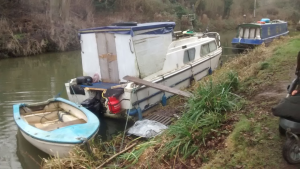
Vulnerable people are living on the water in homemade rafts (floating tents), with no heating, light or sanitation. Damp conditions aboard, unsafe homemade wood burners, no smoke or carbon monoxide alarms, using candles or oil lamps; all add to unsafe environments. It is not uncommon for these types of boats to catch on fire, or raft structures to overturn in bad weather. Looks can be deceiving however, and it is not true to say that all boats that look scruffy on the outside are thus on the inside. Nor can it be said that vulnerable people with health needs cannot be found living on ‘shiny’ boats.
Given a choice, of course people facing homelessness would prefer to live on a little boat, albeit an unsafe or homemade one. However, many of these folk still need access and help from support services. What is happening is that due to them being technically not street homeless, and being tucked away along the canal out of town, they are falling off the radar and not being included in homeless and outreach support services. In many cases, it falls to the rest of the boating community and faith based canal groups such as the Canal Ministries or Waterways Chaplaincy, to offer support and practical help. Again, this situation is similar to that of Gypsies and Travellers who are evicted time and time again, not giving them the chance to access health care or the welfare system.
Accessing the canal is virtually impossible in many places to emergency services. There is little or no road access to the towpath and where there are gates these are often overgrown or locked shut, making ambulance or fire service response times much longer than usual. When making a call to emergency services, you are required to give a postcode. This obviously presents a huge issue when living on the canal where often there are no landmarks or clues as to locations, let alone a postcode. Some work has been done locally to improve emergency services access to the towpath, but this needs to be addressed and applied nationally.
Discrimination and judgements
Liveaboard boaters face discrimination in similar ways to Gypsies and Travellers. Sometimes this can be in the form of verbal abuse, often from holiday boaters of the more partying tendencies. There is also negative stereotyping from passersby and judgements on how tidy or shiny boats might look, or how much ‘tat’ is on the roof. There are many boat owners on the canal who quite openly despise liveaboard boaters, accusing them of being ‘continuously moored’ or ‘bridgehoppers’ (referring to how little some of them are alleged to move their boats). Phrases such as ‘linear scum’, ‘water pikeys’ and ‘river Gypsies’ delivered in aggressive tones are ones thrown at many liveaboards.
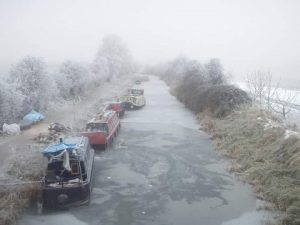
“Go and get a proper job and pay taxes.”
“Why can’t you live like normal people?”
“You all tip your toilets out into the canal or s**t in the hedges.”
“Your curtains are always closed. Are you taking drugs?”
These are all comments that liveaboard boaters are subject to on a regular basis. There are also pockets of areas along canals where thefts, break-ins or pure vandalism occur. It’s not all plain sailing. Train tracks and main roads often run alongside or over canals, meaning some areas are simply not very healthy to live in. This is not dissimilar to the marginal places where Gypsy and Traveller sites are often placed; under motorway flyovers, next to rubbish tips or industrial areas. At least if you live on a boat, you can choose to move.
Cruising into the future
It is far from being all doom and gloom though. The Canal and River Trust have recognized the negative impact their guidelines have had on some boaters and have embedded welfare measures and safeguards into their procedures. They have a dedicated Welfare Officer who has also trained local enforcement officers around ways to support the more vulnerable boaters in their areas.
In recent times, due to the increasing popularity of living on the water, some local authorities have started to include the health needs of boaters within their wider policies and JSNA’s (Joint Strategic Needs Assessments) for Gypsies and Travellers. Local projects such as the Gypsy, Traveller & Boater service run by Julian House in Bath, funded by the Bath & North Somerset CCG, lead the way in raising the health inequalities faced by liveaboard boaters, using staff who are experts by experience to advocate for boaters to healthcare providers, policy makers and council provision.
However, more needs to be done. In other areas of the country where canal communities thrive, such as London, Oxford and Hebden Bridge, statutory services and local authorities should be building provision to include their boating communities and address health inequalities. The NHS needs to improve pathways into secondary care and make provision more flexible and cross-boundary for travelling people. As the canals become more crowded, the strain on already stretched and unreliable services such as water taps, refuse and rubbish collection points and toilet emptying ‘Elsan’ facilities increases. The Canal and River Trust need to invest more in the infrastructure and improve these services. They should also review their policy for home moorings whereby currently people have to bid for bank-side online mooring spots. This means only the more wealthy boat owners are able to buy moorings, while liveaboards who need to stay in one area due to health or schooling commitments, are priced out.
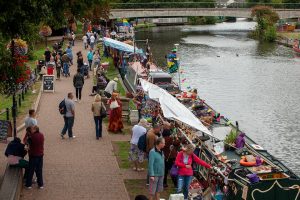
As with the Gypsy and Traveller community, liveaboard boaters have strong sense of community and family. In many cases with boaters, the word ‘family’ is used to describe the boating community rather than flesh and blood ties. However, this sense of kinship amounts to the same. There is a great strength in the liveaboard community. People look out for each other, and help each other in times of hardship. It is a community that brings people from differing ages, backgrounds and beliefs together. The enormous amount of talent from artists, musicians, photographers and crafts folk that the boating community has within it can be seen in any of the vibrant floating markets based along the canal network. Many people describe how their mental health has been vastly improved by leaving the ‘rat race’ and moving onto the canals. The slower pace of life, the community and the beautiful surroundings, the feeling of being close to nature and wildlife all have positive impacts on mental health and well being.
The New Bargee Travellers are bringing life and love back to our once empty, derelict canals, and they are here to stay, albeit whilst cruising along. Like many land based travelling communities, they may not have a home base or mooring, but they definitely do have homes and along with Gypsies and Travellers, should be able to access health care they are entitled to, like any other home owner.
Top photograph: Fanny Gorman.
Notes for Editor
About Friends, Families and Travellers (FFT)
Friends, Families and Travellers is a leading national charity that works on behalf of all Gypsies, Roma and Travellers regardless of ethnicity, culture or background.
Media Contact
Lucy Hetherington, Communications Officer
Tel: 01273 234 777 Email: [email protected]
